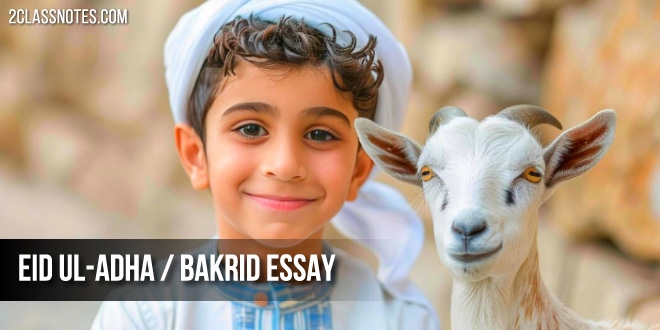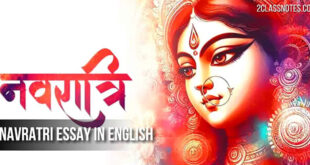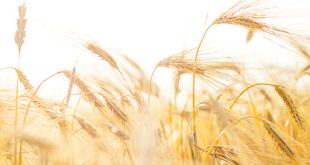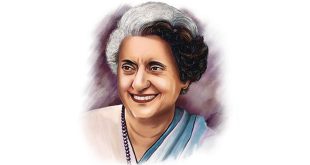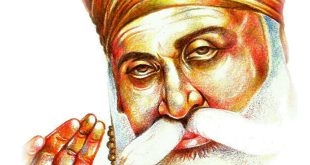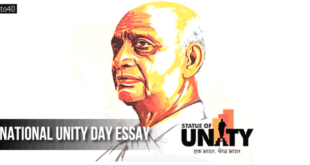Bakrid, also known as Eid ul-Adha, is one of the most significant and revered festivals in the Islamic calendar. This festival, celebrated by Muslims across the world, marks the culmination of the Hajj pilgrimage to Mecca and honors the unwavering faith and devotion of Prophet Ibrahim (Abraham) to Allah. Bakrid, often referred to as the “Festival of Sacrifice,” commemorates the story of Ibrahim’s willingness to sacrifice his son Ismail in obedience to Allah’s command. In recognition of his devotion, Allah provided a ram to be sacrificed instead, making this act a pivotal moment in Islamic tradition.
Below are the 2 Essays on Eid ul- Adha / Bakrid:
Eid ul-Adha / Bakrid Essay [1]
The Importance of Eid ul-Adha: A Celebration of Faith and Giving
Eid ul Adha is a Muslim festival celebrated all over the world. This beautiful festival is a festival of sacrifice and one of the special occasions for Muslims. This festival is celebrated to honour the story of iBrahim’s willingness to sacrifice his son’s smile as an act of obedience to the almighty god. The celebration of Bakra Eid reminds us of the values of generosity, forgiveness, compassion, honesty, etc. In many countries, the day of Eid ul Adha is considered a holiday so that every Muslim family can celebrate this festival properly while making eye contact, spending time with the family, and sharing with the needy and their neighbours. Eid ul Adha is a day of sacrifice, sharing love, and showing compassion towards your well-being.
In this festival, families gather together for the celebration, where men go for namaz in the mosque or the designated place for wild dressing in the best attack, while women prepare the home for the celebration. This festival is an assembly of unity and reflection where Muslims recite to see blessings and mercy for themselves, their families, and their neighbours from God. This festival is a day of joy, gratitude, and forgiveness.
The main thing about Eid al-Adha is the tradition of Qurbani, of a sheep goat, an account, or a camel to sacrifice. This act of sacrificing shows the devotion of Ibrahim’s and God’s mercy on him when he followed the command of God. The needs of the sacrificed animal are divided into three parts: one part is kept for family, one part is given to relatives and friends, and the third part is shared with the people if you cannot afford kurbani or with the poor. Sharing the meat of Qurbani is always an act of blessing and compassion for others.
Moreover, this festival can be a family get-together, and everyone can enjoy delicious means like biryani for varieties of nonveg curry at different times. Sharing meals together on a family get-together strengthens the bonds between members, and the atmosphere fills with love, sharing, caring, etc. In this festival, apart from distributing me to family, friends, and neighbourhood, the neighbourhood, the poor c can also decorate their houses and give gifts to the needy people, the neighbourhoods, or to family or friends that will help you create a sense of community d im improve your well-being.
Eid ul Adha not only teaches valuable lessons like sacrifice and the tooth but also creates and encourages a sense of well-being for others in the neighbourhood and the poor. This festival helps us to think beyond ourselves and to demolish the mountain of selfishness that we have built over the years by distributing gifts, including Suez or any gift, to the poor and the needy. If you cannot gift to others, you can share the message of Qurbani and demonstrate the message of helping others and spreading happiness, which will affect your well-being positively.
In conclusion, Eid in Adhar is not just a holiday; it’s a day where you can dive into the face and seek mercy from God, straighten your well-being and community, and practice generosity by sharing or meeting with Qurbani. This festival remains a reminder of the importance of compassion and humility, which is one of the major characteristics of a Muslim. As Muslims celebrate this festival every year, they honour their feet and try to embody the teachings of Islam in themselves towards kindness and love to all.
Eid ul-Adha / Bakrid Essay [2]
The Muslim Festival of Eid ul-Adha: A Celebration of Sacrifice and Faith
Eid ul-Adha, also known as the “Festival of Sacrifice,” is one of the most significant and revered holidays in the Islamic calendar. This festival, which marks the culmination of the Hajj pilgrimage to Mecca, commemorates the unwavering faith and devotion of Prophet Ibrahim (Abraham) to Allah. Eid ul-Adha 2024, like every year, will be celebrated by millions of Muslims around the world with prayers, sacrifices, and communal gatherings.
The Historical Significance of Eid ul-Adha:
Eid ul-Adha is rooted in the story of Prophet Ibrahim’s willingness to sacrifice his son, Ismail, in obedience to Allah’s command. According to Islamic tradition, Allah tested Ibrahim’s faith by asking him to sacrifice his beloved son. Despite the profound emotional pain, Ibrahim prepared to comply. However, just as he was about to perform the act, Allah intervened and provided a ram to be sacrificed instead. This act of devotion and submission is commemorated annually by Muslims through the ritual of Qurbani, or animal sacrifice.
The Spiritual and Communal Aspects:
The essence of Eid ul-Adha lies in its spiritual and communal dimensions. The day begins with a special prayer, known as Salat al-Eid, which is performed in congregation. This prayer, usually held in mosques or open fields, is a moment of unity and collective worship. The sermon that follows the prayer emphasizes the themes of sacrifice, devotion, and compassion.
One of the central rituals of Eid ul-Adha is the Qurbani. Families who can afford to do so sacrifice an animal, such as a goat, sheep, cow, or camel, to honor Ibrahim’s willingness to sacrifice his son. The meat from the sacrifice is divided into three parts: one-third is given to the poor and needy, one-third is shared with relatives and friends, and one-third is kept for the family. This act of giving and sharing reinforces the values of charity, gratitude, and community.
Celebrations Around the World:
Eid ul-Adha is celebrated with great fervor and joy in Muslim-majority countries and communities worldwide. In countries like Saudi Arabia, Pakistan, Egypt, and Indonesia, the holiday is marked by public holidays, grand feasts, and vibrant social gatherings. In the United States, Canada, and other countries with significant Muslim populations, communities come together to perform the Eid prayers and celebrate with festive meals and activities.
In the United States and Canada, many Muslims gather for the morning prayers at mosques or in open spaces, followed by communal meals and socializing. In Egypt, the day is celebrated with prayers, feasts, and the act of Qurbani, with the meat distributed among family, friends, and the less fortunate. Similarly, in Pakistan, stores are closed, and the focus is on prayer, sacrifice, and sharing.
The Importance of Sacrifice and Charity:
The act of sacrifice during Eid ul-Adha serves as a reminder of the trials faced by Prophet Ibrahim and his complete submission to Allah’s will. It also underscores the importance of selflessness and charity. By distributing the meat of the sacrificed animal, Muslims are encouraged to remember and assist those who are less fortunate. This practice not only fulfills a religious duty but also fosters a sense of brotherhood and community spirit.
It is crucial to understand that the sacrifice of animals during Eid ul-Adha is not about the meat or the blood reaching Allah but about the devotion and piety of the person performing the sacrifice. As stated in the Quran, “It is neither their meat nor their blood that reaches Allah; it is your piety that reaches Him” (Quran 22:37). This highlights the symbolic nature of the sacrifice, which is meant to reflect a Muslim’s willingness to give up something valuable in obedience to Allah.
The Sunnahs of Eid ul-Adha:
Observing the Sunnahs, or traditions of Prophet Muhammad (PBUH), is an important aspect of Eid ul-Adha. These include:
- Performing Ghusl (ritual purification) before the Eid prayer.
- Wearing the best clothes available, preferably new or clean ones.
- Refraining from eating before the Eid prayer.
- Reciting the Takbir (praising Allah) loudly on the way to the prayer ground.
- Taking a different route back home after the prayer.
Conclusion:
Eid ul-Adha will be a time of joy, reflection, and unity for Muslims around the world. This festival, rich in history and significance, reminds the faithful of the importance of obedience to Allah, the value of sacrifice, and the virtue of charity. By engaging in the rituals and traditions of Eid ul-Adha, Muslims not only honor the legacy of Prophet Ibrahim but also strengthen their bonds with their community and deepen their faith. This sacred occasion is a powerful reminder of the blessings of Allah and the importance of living a life of piety, compassion, and gratitude.
 Class Notes NCERT Solutions for CBSE Students
Class Notes NCERT Solutions for CBSE Students
